- Home
- Edward Rutherfurd
Princes of Ireland Page 2
Princes of Ireland Read online
Page 2
Finbarr looked at his friend and shook his head. It was midafternoon and Conall was about to race.
“You could at least smile,” Finbarr remarked. “You’re such a sad fellow, Conall.”
“I’m sorry,” the other replied. “I don’t mean to be.”
That was the trouble with being too highly born, Finbarr considered. The gods paid too much attention to you. It was ever thus in the Celtic world. Ravens would fly over the house to announce the death of a clan chief, swans would desert the lake. A king’s bad judgement could affect the weather. And if you were a prince, the druids made prophesies about you from before the day you were born; and after that, there was no escape.
Conall: slim, dark, aquiline, handsome—a perfect prince. And a prince he was. Conall, son of Morna. His father had been a matchless warrior. Hadn’t he been buried standing up, in a hero’s mound, facing towards the enemies of his tribe? It was the finest compliment you could pay to a dead man in the Celtic world.
In the family of Conall’s father, it was unlucky for any man to wear red. But that was only the beginning of Conall’s troubles. He had been born three months after his father’s death. That alone made him special. His mother was the sister of the High King, who became his foster father. That meant the whole island would be watching him. And then the druids had had their say. The first had shown the baby a selection of twigs from various trees and the infant had stretched out a tiny hand towards the hazel. “He will be a poet, a man of learning,” the druid declared. A second had made a darker prediction. “He will cause the death of a fine warrior.” But so long as this was in battle, the family took it as a good omen. It was the third druid, however, who pronounced the three geissi which were to follow Conall all his life.
The geissi—the prohibitions. When a prince or a great warrior lived under geissi he had better be careful. The geissi were terrible, because they always came to pass. But since, like so many priestly pronouncements, they sounded like a riddle, you couldn’t always be certain what they meant. They were like traps. Finbarr was glad no one had bothered to lay any geissi on him. The geissi on Conall, as everyone at the High King’s court knew, were as follows:
Conall shall not die until:
First: He has laid his own clothes in the earth.
Second: He has crossed the sea at sunrise.
Third: He has come to Tara through a black mist.
The first made no sense; the second he must take care never to do. The third seemed impossible. There were often mists at the High King’s royal seat at Tara, but there had never been a black one.
Conall was a careful fellow. He respected family tradition. Finbarr had never seen him wear anything red. Indeed Conall even avoided touching anything of that colour. “So it seems to me,” Finbarr had once told him, “that if you can just stay away from the sea, you’ll live forever.”
They had been friends since the day, in childhood, when a hunting party that included young Conall had stopped at Finbarr’s family’s modest farm to rest. The two boys had met and played, and before long had a wrestling match and then played the game with stick and ball which the islanders call hurling, while the men looked on. A little while later Conall had asked if he might seek out his new acquaintance again; within a month they were fast friends. And when, soon afterwards, Conall had asked if Finbarr might join the royal household and train to become a warrior, this had been granted. Finbarr’s family had been overjoyed at such an opportunity for him. The friendship of the two boys had never wavered. If Conall loved Finbarr’s good nature and high spirits, Finbarr admired the young aristocrat’s quiet, deeper thoughtfulness.
Not that Conall was always reserved. Though not the brawniest of the young champions, he was probably the finest athlete. He could run like a deer. Only Finbarr could keep up with him when they raced their light, two-wheeled war chariots. When Conall threw a spear, it seemed to fly like a bird, and with deadly accuracy. He could whirl his shield round so fast that you could scarcely see it. And when he struck with his favourite shining sword, it was said that others may give harder blows, but take care—Conall’s blade is always swifter. The two boys were also musical. Finbarr liked to sing, Conall to play the harp, which he did well; and as boys they would sometimes entertain the company at the High King’s feasts. These were happy times when, good-humouredly, the High King would pay them as though they were hired musicians. The warriors all liked and respected Conall. Those who remembered Morna agreed: the son had the makings of a similar leader.
And yet—this was the strange thing to Finbarr—it was as if Conall wasn’t really interested.
Conall had been only six the first time he disappeared; and his mother had already been searching all afternoon when, just before sundown, he appeared with an old druid who quietly told her, “The boy’s been with me.”
“I found him in the woods,” Conall had explained, as if his absence was the most natural thing in the world.
“What did you do with the druid all day?” his mother asked after the old man had left.
“Oh, we talked.”
“What about?” his astonished mother asked.
“Everything,” he said happily.
It had been the same ever since his childhood. He would play games with the other boys, but then he’d disappear. Sometimes he’d take Finbarr with him, and they would wander in the woods or along the streams. Finbarr could imitate bird calls. Conall liked that. And there was hardly a plant on the island that the young prince couldn’t name. But even on these walks sometimes Finbarr would sense that, much as his friend loved him, he wished to be alone; and then he would leave him, and Conall would wander away for half a day.
He always insisted to Finbarr that he was happy. Yet when he was deep in thought, his face would take on a look of melancholy; or sometimes when he was playing the harp, the tune would become strangely sad. “Here comes the man whom sorrow makes his friend,” Finbarr would say affectionately when Conall returned from his lonely wanderings; but the young prince would only laugh, or punch him playfully and break into a run.
It was hardly surprising that by the time he reached the age of manhood at seventeen, the other young men should refer to Conall, not without awe, as the Druid.
There were three classes of learned men on the island. The humblest were the bards, the storytellers who would entertain the company at a feast; of a higher class entirely were the filidh, guardians of the genealogies, makers of poetry, and even sometimes of prophesy; but above them both, and more fearsome, were the druids.
It was said that long ago, before the Romans had come there, the most learned and skilful druids had lived on the neighbouring island of Britain. In those days, the druids used to sacrifice not only animals but men and women, too. That was long ago, however. The druids were in the western island now, and nobody could remember the last human sacrifice.
The training of a druid could take twenty years. He would often know most of what the bards and filidh knew; but beyond that, he was a priest, with the secret knowledge of the sacred spells and numbers and of how to speak with the gods. The druids performed the sacrifices and ceremonies at midwinter and the other great festivals of the year. The druids directed upon which days to sow the crops and slaughter the animals. Few kings would dare start any enterprise without consulting the druids. Quarrel with them and their words could be so sharp, it was said, that they raised blisters. A druid’s curse could last for seventeen generations. Wise advisers, respected judges, learned teachers, feared enemies: the druids were all these things.
But beyond this lay something more mysterious. Some druids, like shamans, could go into trances and enter the otherworld. They could even change their own shape into that of a bird or an animal. Was there something of this mystical quality, Finbarr sometimes wondered, in his friend Conall?
Certainly he had always spent a lot of time with the druids, ever since that childhood encounter. By the time he was twenty, it was said, he knew more than most of t
he young men training for the priesthood. Such an interest was not thought strange. Many of the druids came from noble families; some of the greatest warriors had studied with druids or filidh in the past. But Conall’s degree of interest was unusual, as was his expertise. His memory was phenomenal.
Whatever Conall said, it seemed to Finbarr he was sometimes lonely.
To seal their friendship, some years earlier, the prince had given him a puppy. Finbarr had taken the little fellow everywhere. He called him Cuchulainn, after the hero of legend. Only gradually, as the puppy grew, had Finbarr come to realise the nature of the gift. For Cuchulainn turned out to be a magnificent hunting hound, of the kind for which merchants came to the western island from far across the sea, and for which they would pay with ingots of silver or Roman coins. The hound was probably priceless. It never left his side.
“If ever something happens to me,” Conall once told him, “your hound Cuchulainn will be there to remind you of me and of our friendship.”
“You’ll be my friend as long as I live,” Finbarr assured him. “I expect it’s I who will die first.” And if he couldn’t give the prince a present of similar value in return, he could at least, he thought, make sure that his own friendship was as constant and loyal as the hound Cuchulainn was to him.
Conall also had another talent. He could read.
The people of the island were not strangers to the written word. The merchants from Britain and Gaul who came to the ports could often read. The Roman coins they used had Latin letters on them. Finbarr knew several amongst the bards and druids who could read. A few generations ago, the learned men of the island, using vowel and consonant sounds from Latin, had even invented a simple writing of their own for carving memorials in Celtic upon standing posts or stones. But though from time to time one would come upon a standing stone with these strange ogham scratch marks, like notches on a tally stick, down its edge, this early Celtic writing system had never become widely used. Nor, Finbarr knew, was it used for recording the island’s sacred heritage.
“It is not hard to tell why,” Conall had explained to him. “Firstly, the knowledge of the druids is secret. You wouldn’t want some unworthy person reading it. That would anger the gods.”
“And the priests would lose their secret power as well,” Finbarr remarked.
“That is perhaps true. But there is a further reason. The great possession of our learned men, bards, filidh, and druids is their feat of memory. This makes the mind very strong. If we wrote down all our knowledge so that we didn’t have to remember it, our minds would grow weak.”
“So why have you learned to read?” Finbarr had asked.
“I am curious,” Conall had said, as if this were natural. “Besides,” he had smiled, “I am not a druid.”
How often had those words echoed in Finbarr’s mind. Of course his friend was not a druid. He was going to be a warrior. And yet … Sometimes when Conall sang and closed his eyes, or when he returned from one of his solitary wanderings with a faraway, melancholy look, as though he were in a dream, Finbarr couldn’t help wondering if his friend had not entered … He did not know what. A borderland of some kind.
And so he had not really been surprised when, towards the end of spring, Conall had confessed: “I want to take the druid’s tonsure.”
The druids shaved straight up from their ears over the top of the head. The effect of this tonsure was to give a high, rounded forehead; unless of course the druid was already going bald at the front, in which case the tonsure hardly showed. In Conall’s case, since his hair was thick, the tonsure would leave a dark, V-shaped shaved area over his brow.
There had certainly been princely druids before. Indeed, many people on the island considered the druid caste to be higher than even kings. Finbarr had looked at his friend thoughtfully.
“What will the High King say?” he had asked.
“It is hard to say. It is a pity that my mother was his sister.”
Finbarr knew all about Conall’s mother: her devotion to his father’s memory, her determination that her son should follow in his father’s footsteps as a warrior. When she had died two years ago, she had begged the High King—her brother—to make sure that her husband’s line should be continued.
“Druids marry,” Finbarr pointed out. Indeed, the druid’s position was often transferred from father to son. “You could have children who would be warriors.”
“That is true,” said Conall. “But the High King may think otherwise.”
“Could he forbid you, if the druids want you to join them?”
“I think,” Conall replied, “that if the druids know the High King does not wish it, they will not ask.”
“What will you do?”
“Wait. Perhaps I can persuade them.”
It had been a month later that the High King had summoned Finbarr.
“Finbarr,” he had begun, “I know you are my nephew Conall’s closest friend. You know of his wish to become a druid?” Finbarr had nodded. “It would be a good thing if he changed his mind,” the High King said. That was all. But from the High King, it was enough.
She hadn’t wanted to come. There were two reasons. The first, Deirdre knew, was selfish. She didn’t like leaving home.
It was a strange place to live, but she loved it. In the middle of the island’s eastern coast, a river, having descended from the wild Wicklow Mountains just to the south and made a sweeping inland curve, came out through an estuary into a broad bay with two headlands—as if, Deirdre thought, the Earth goddess Eriu, the island’s mother, was stretching her arms to embrace the sea. Inland, the river formed a broad flood basin known as the Liffey Plain. It was a river of changing moods, subject to sudden rages. When it was angry, its swollen waters would hurtle down from the mountains in violent flash floods which carried all before them. But these fits of rage were only occasional. Most of the time, its waters were tranquil and its voice was soft, whispering, and melodic. With its wide tidal waters, wooded marshes, and low mudflats fringed with grasses, the estuary was usually a place of silence, but for the cries of the distant gulls and the piping curlews and the heron gliding over the shell-strewn shoreline strands.
It was almost deserted, except for the few scattered farmsteads under her father’s rule. Two small features there were, however, each of which had already given the place a name. One, just before the river opened out into its mile-wide marshy estuary, was man-made: a wooden trackway across the marshland, which crossed the river at its shallowest point on hurdles and continued until it reached firmer ground on the northern bank. Ath Cliath this was called in the island’s Celtic tongue—the Ford of Hurdles—which was pronounced roughly as “Aw Cleeya.”
The second feature was natural. For the spot where Deirdre was standing lay at the eastern end of a low ridge that ran along the southern bank overlooking the ford. Below her, a stream came from the south to join the river, and just before it did so, encountering the end of the little ridge, it made a small bend, in whose angle there had developed a deep, dark pool. Blackpool, they called it: Dubh Linn. To the ear it sounded “Doov Lin.”
But though it had two names, hardly anybody lived there. Up on the slopes of the Wicklow Mountains there had been settlements since time out of mind. There were fishing villages and even small harbours along the coast both north and south of the river’s mouth.
Down by the river marshes, however, though Deirdre loved their quiet beauty, there was not much reason to settle.
For Dubh Linn was a borderland, a no-man’s-land. The territories of powerful chiefs lay to the north, south, and west of the estuary, but even if one or the other claimed a sovereignty from time to time, they had little interest in the area; and so her father, Fergus, had remained undisturbed as the chieftain of the place.
Deserted as it might be, Fergus’s territory was not without significance, for it lay at one of the island’s important crossroads. Ancient tracks, often hewn through the island’s thick forests and known as sl
ige, came from north and south to cross at the ford. The old Slige Mhor, the Great Road, ran west. As well as being the guardian of the crossing, Fergus also offered the island’s customary hospitality to travellers at his house.
Once, the place had been busier. For centuries, the open sea beyond the bay had been more like a great lake between the two islands where the many tribes of her people dwelt, and across which they had traded, and settled, and married back and forth for many generations. When the mighty Roman Empire had taken over the eastern island—Britain, they had called it—Roman merchants had come to the western island and set up little trading posts along the coast, including the bay, and would sometimes come into the estuary. Once, she knew, Roman troops had even landed and set up a walled camp from which the disciplined Roman legionaries with their bright armour had threatened to take over the western isle as well. But they had not succeeded. They had gone away, and the magical western island had been left in peace. She was proud of that. Proud of the land and people of Eriu who had kept to the ancient ways and never submitted.
And now the mighty Roman Empire was in retreat. Barbarian tribes had breached her borders; the imperial city of Rome itself had been sacked; the legions had left Britain; and the Roman trading posts were deserted.
Some of the more adventurous chieftains on the western island had done well out of these changing times. There had been huge raids on the now defenceless Britain. Gold, silver, slaves—all kinds of goods had come across to enrich the bright halls of Eriu. But these expeditions went out from harbours farther up the coast. Though merchants still ventured from time to time into the Liffey estuary, the place was hardly busy.
The house of Fergus, son of Fergus, consisted of a collection of huts and stores—some thatched, some roofed with turf—in a circular enclosure on the rise above the pool, surrounded by an earth wall and fence. This ring fort, to give the little earthwork its technical name, was one of a number starting to appear on the island. In the local Celtic tongue it was called a rath. In essentials, the rath of Fergus was a larger version of the simple farmstead—a dwelling house and four animal sheds—to be found all over the more fertile parts of the island. There was a small piggery, a cattle pen, a grain store, a handsome hall, and a smaller secondary dwelling house. Most of these were circular, with strong wattle walls. Into these various accommodations could easily be fitted Fergus, his family, the cattleman and his family, the shepherd, two other families, three British slaves, the bard—for the chief, mindful of his status, kept his own bard, whose father and grandfather had held the position before him—and, of course, the livestock. In practice, these numerous souls were seldom all there at the same time. But they could still be accommodated for the simple reason that people were accustomed to sleeping communally. Set on the modest rise overlooking the ford, this was the rath of Fergus, son of Fergus. Below it, a small water mill by the stream and a landing place by the river completed the settlement.

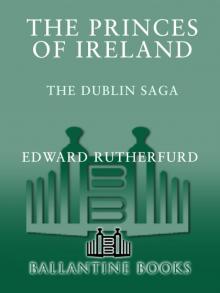 Princes of Ireland
Princes of Ireland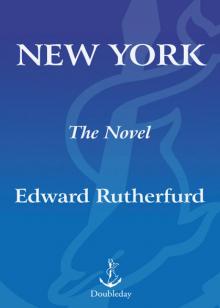 New York
New York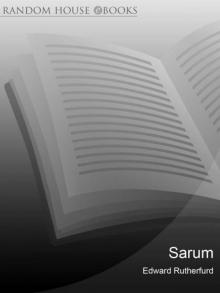 Sarum
Sarum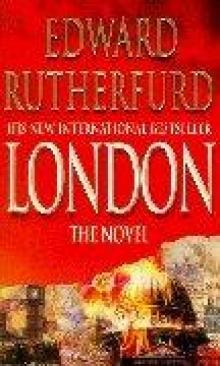 London
London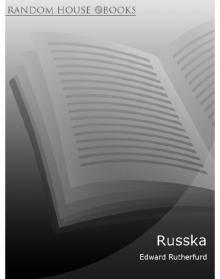 Russka: The Novel of Russia
Russka: The Novel of Russia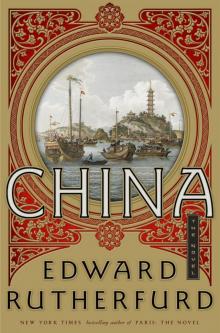 China
China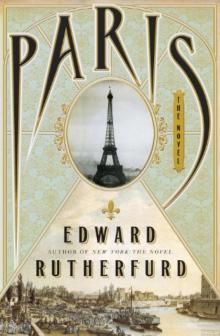 Paris
Paris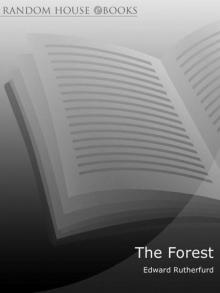 The Forest
The Forest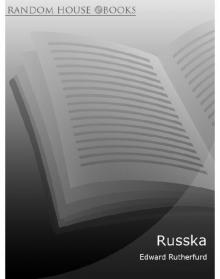 Russka
Russka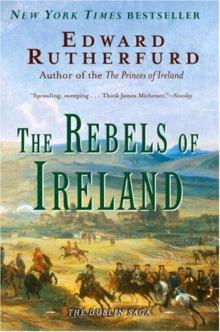 The Rebels of Ireland: The Dublin Saga
The Rebels of Ireland: The Dublin Saga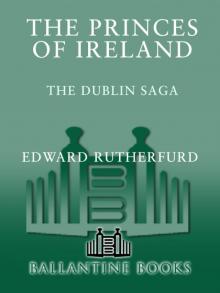 The Princes of Ireland
The Princes of Ireland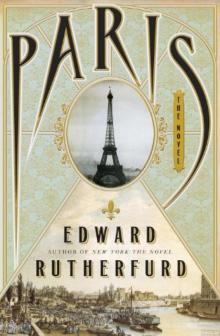 Paris: The Novel
Paris: The Novel